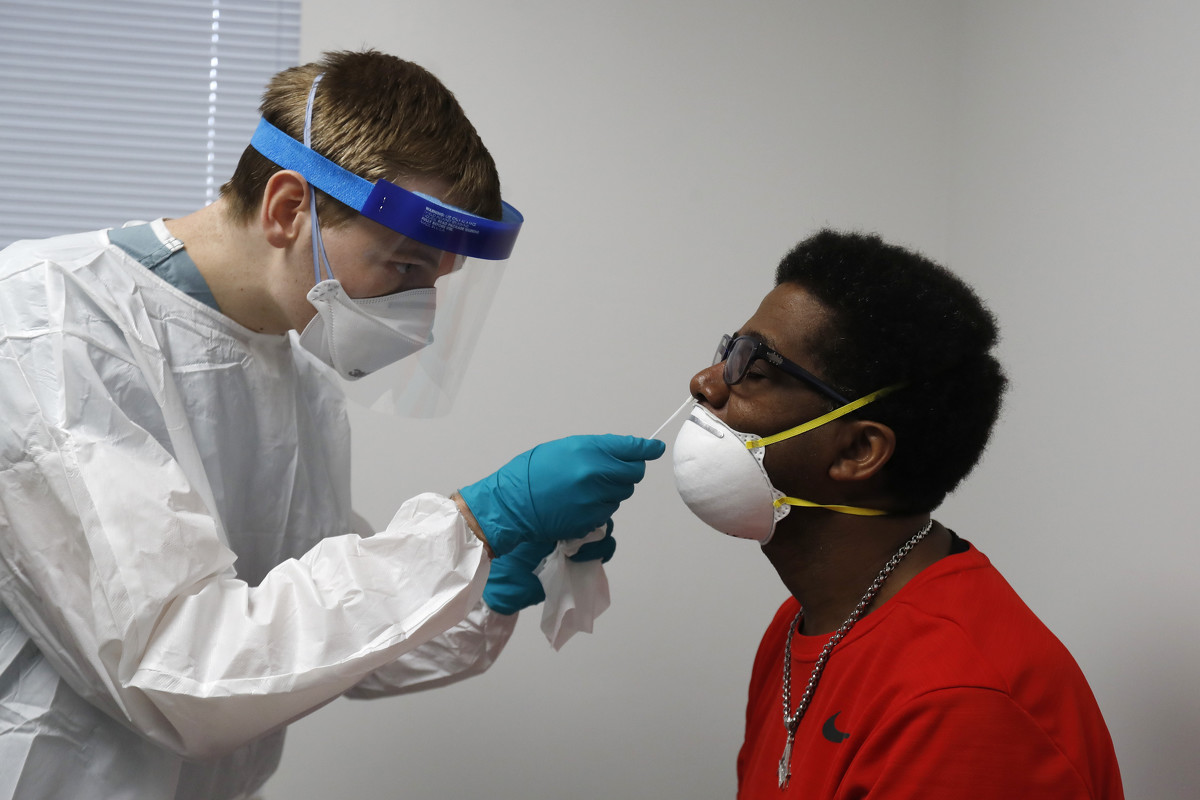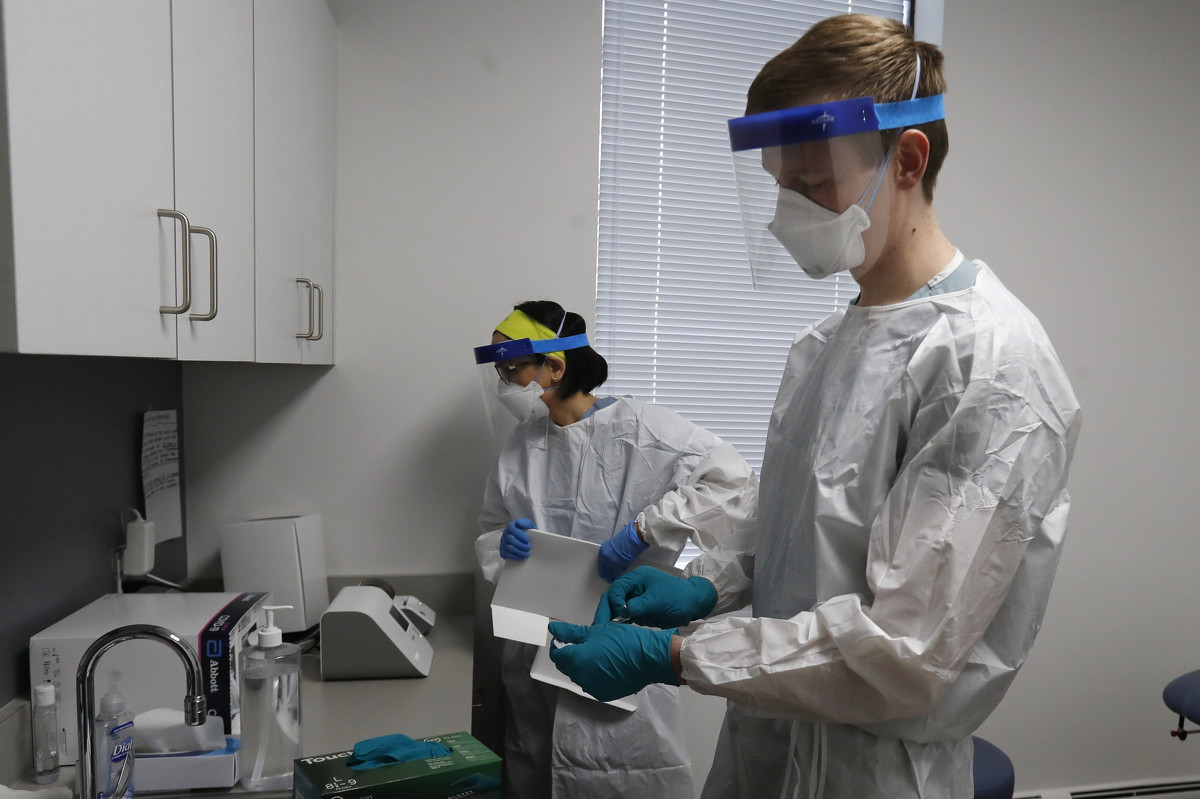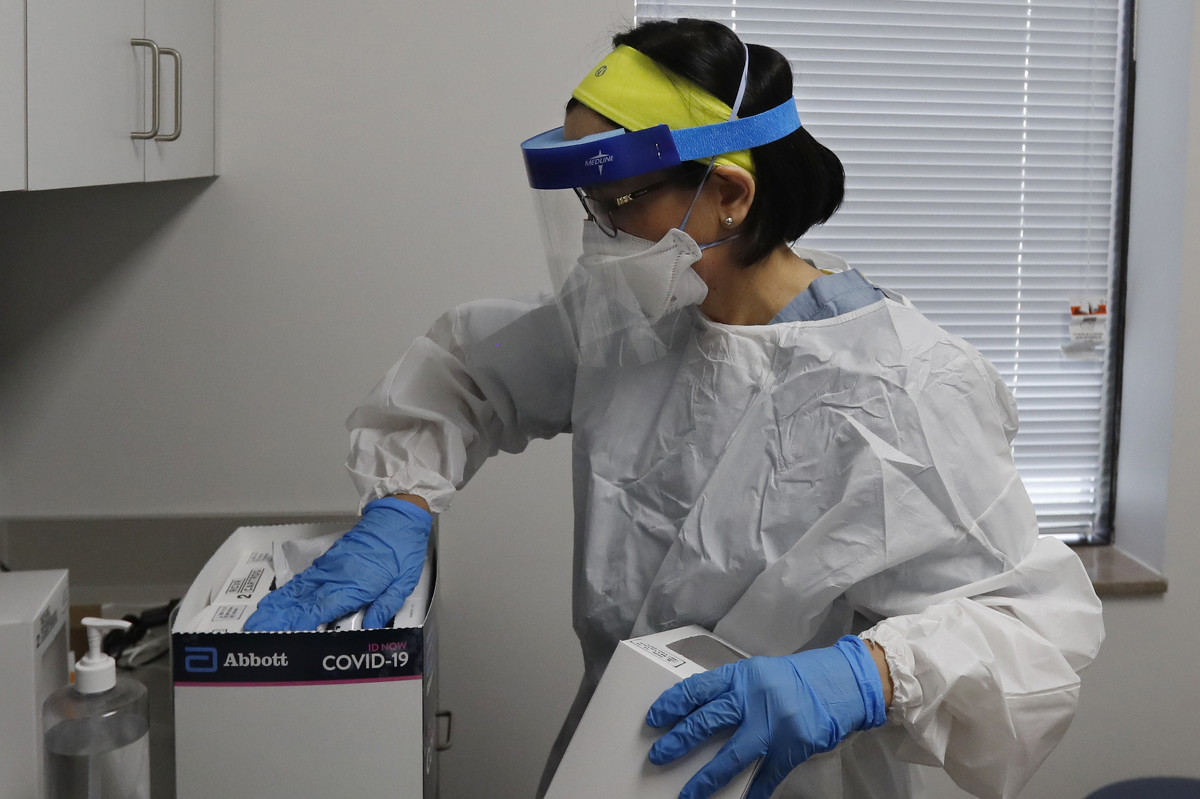
In this Friday, April 24, 2020 photo, Wayne State University medical school student Michael Moentmann swabs Leon Wheeler's nostril at a COVID-19 testing center in Detroit. Moentmann, 23, had planned to observe surgeries this spring but then a highly contagious virus disrupted everything. So he's volunteering in one of America's hardest-hit cities, testing police officers, firefighters, bus drivers and other essential workers who keep Detroit running. (AP Photo/Carlos Osorio)
DETROIT (AP) - City employees make critical visits to the Detroit health department for a coronavirus test. On the other side of the long cotton swab: medical students in protective gear who have volunteered to be on the front line of the fight.
"We'll just go in about an inch, swirl around a couple times," Michael Moentmann calmly explained before swabbing the nostril of water department employee Leon Wheeler.
Moentmann, 23, had planned to watch surgeries as a medical student at Wayne State University in Detroit, but then a highly contagious virus disrupted everything this spring. So he signed up in one of America's hardest-hit communities, testing police officers, firefighters, bus drivers and others who keep the city running.
Indeed, a fleet of medical students has been vital in Detroit's response to the coronavirus and the sometimes deadly COVID-19. Cloaked in gowns, masks and face shields, they spend hours swabbing people and running tests through rapid-response machines. The results determine whether key staff can work or go home to recover.
"What better way to launch a medical career than helping with a pandemic? We couldn't do this without them," said John Zervos of Henry Ford Health System in Detroit, who recruited roughly 80 students from medical schools at Wayne State, the University of Michigan and Michigan State University.

In this Friday, April 24, 2020 photo, Wayne State University medical school students Lucia Luna-Wong, left and Michael Moentmann work in a COVID-19 testing center in Detroit. The students are volunteering in one of America's hardest-hit cities, testing police officers, firefighters, bus drivers and other essential workers who keep Detroit running. (AP Photo/Carlos Osorio)
Med students are pitching in elsewhere, too. In Richmond, Virginia, they have volunteered to care for the children of health care workers. Students at a Chicago-area medical school, Midwestern University, are offering to screen patients at clinics, deliver food to exhausted doctors and even check pets.
In Detroit, students have swabbed or run tests on more than 6,000 people, including nursing home residents who had an infection rate of roughly 25%. The information is important for stopping the spread of the coronavirus. The city has 6% of Michigan's population but 27% of the state's COVID-19 deaths.
Mayor Mike Duggan repeatedly has praised the students, saying it was "remarkable" to have them in the "labs at 1, 2 in the morning."
Lucia Luna-Wong, a fourth-year student at Wayne State, said she didn't hesitate when offered a chance to join a "crash course in public health." She wants to specialize in infectious diseases.
"This is so valuable, from bedside manners to learning about health disparities in the city. This is just an unbelievable experience for me. I'm going to be a better doctor," said Luna-Wong, 38, a native of Peru.
Moentmann, a third-year-student, said he tries to help anxious people regain control.
"I'm not qualified right now to be a critical care pulmonologist, but I am qualified to swab someone's nose. ... I am arguably at the most appropriate place that I can be right now as a medical student, the place where I have the most face time with patients, the place where I get to experience that provision of care in our little 13-minute interaction," he said.
Moentmann said his mother in Lancaster, Ohio, asked about his safety when he told her about his work against the virus.
"I sent her a picture of me in the full garb," he said. "A little bit of convincing, but she's all good."
Moentmann and Luna-Wong speak to people privately when they discuss test results. Wheeler, the water department employee, looked relieved when he emerged from the room.
"I'm good," he said.
___
Follow Ed White at http://twitter.com/edwhiteap

In this Friday, April 24, 2020 photo, Wayne State University medical school student Lucia Luna-Wong checks COVID-19 test kits at a testing center in Detroit. Luna-Wong said she didn't hesitate when offered a chance to join what she calls a "crash course in public health." She wants to specialize in infectious diseases. She's volunteering in one of America's hardest-hit cities, testing police officers, firefighters, bus drivers and other essential workers who keep Detroit running. (AP Photo/Carlos Osorio)